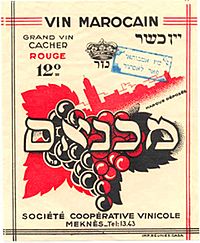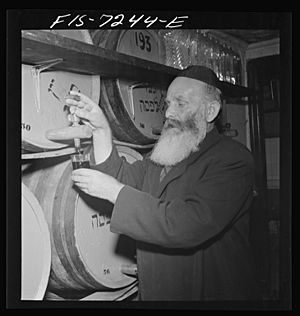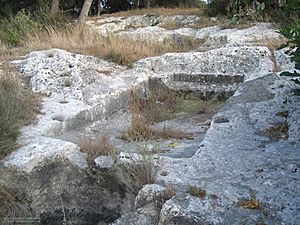Kosher wine facts for kids

Kosher wine label from 1930
|
|
| Halakhic texts relating to this article | |
|---|---|
| Torah: | Deuteronomy 32:38 |
| Mishnah: | Avodah Zarah 29b |
| Babylonian Talmud: | Avodah Zarah 30a |
Kosher wine (Hebrew: יין כשר, yayin kashér) is a special type of wine. It is made following strict Jewish laws called halakha, specifically the rules of kashrut. This means that Jewish people are allowed to say blessings over it and drink it. Wine is very important in many Jewish ceremonies, especially during a blessing called Kiddush.
To make wine kosher, Sabbath-observant Jews must watch over the whole process. They often handle the grapes themselves, from when they are first crushed until the wine is bottled and sealed. Also, all ingredients used, even things that help clear the wine (called finings), must be kosher. If wine is labeled "kosher for Passover", it means it has not touched any leavened or fermented grain products. This includes many common additives.
When kosher wine is sold, it usually has a special mark called a hechsher. This mark shows that a trusted kosher certification agency, a respected rabbi (a Jewish religious leader), or a Jewish court (called a beth din) has checked and approved it.
Today, more and more people want kosher wines. Many countries now make different kinds of fancy kosher wines. These wines are made under the careful eye of rabbis. Some of these countries include Israel, the United States, France, Germany, Italy, South Africa, Chile, and Australia. Two of the biggest companies that make and sell kosher wines, Kedem and Manischewitz, are in the Northeast of America.
History of Kosher Wine
Wine has been important in Judaism for a very long time, even back to biblical times. Old discoveries show that people made wine all over ancient Israel. Jewish people living in different parts of the world (called the Jewish diaspora) continued to use wine for their traditions and religion. In the United States, kosher wines became known for being sweet Concord wines. These were often made by wineries started by Jewish immigrants in New York.
In the 1980s, things started to change. People began making dry, high-quality kosher wines. This happened as the Israeli wine industry grew again. Now, kosher wine is made not just in Israel but all over the world. This includes famous wine areas like Napa Valley in California and the Saint-Émilion area in Bordeaux, France.
Wine's Role in Jewish Holidays
Wine plays a big part in almost all Jewish holidays. For example, during the Passover Seder, everyone drinks four cups of wine. On Purim, wine is part of the festive meal. And on Shabbat, people say special blessings (called Kiddush) over cups of kosher wine before drinking it. Grape juice can also be used for these occasions. If there is no wine or grape juice on Shabbat, a blessing over challah (a special bread) can be used instead.

At Jewish weddings, ceremonies for redeeming a first-born son, and other events, people almost always say the blessing Borei Pri HaGafen ("Blessed are you O Lord, Who created the fruit of the vine") over kosher wine or grape juice.
Some Jewish teachings, called the Midrash, say that the forbidden fruit Eve ate and gave to Adam was a grape, from which wine is made. However, others believe it was a fig.
Rules for Kosher Wine
Wine has a special role in many non-Jewish religions. Because of this, Jewish kashrut laws say that wine cannot be kosher if it might have been used for worshipping idols. These laws include rules about Yayin Nesekh (יין נסך), which is wine poured to an idol. There's also Stam Yeynam (סתם יֵינָם), which is wine touched by someone who believes in idolatry or made by non-Jews.
However, if kosher wine is yayin mevushal (יין מבושל), meaning it has been "cooked" or "boiled," it cannot be used for idol worship. This means it stays kosher even if someone who believes in idolatry touches it later.
The ingredients in wine (like alcohol, sugars, acidity, and phenols) are not usually non-kosher. Instead, the kashrut laws for wine focus on who handles the wine and what tools they use. For wine to be kosher, only Sabbath-observant Jews can handle it. This rule applies from the moment the liquid separates from the grape solids until the wine is pasteurized or the bottles are sealed. Wine labeled "kosher for Passover" must also be kept away from chametz (leavened grain products) and kitnios (like legumes and corn products).
 | Claudette Colvin |
 | Myrlie Evers-Williams |
 | Alberta Odell Jones |


